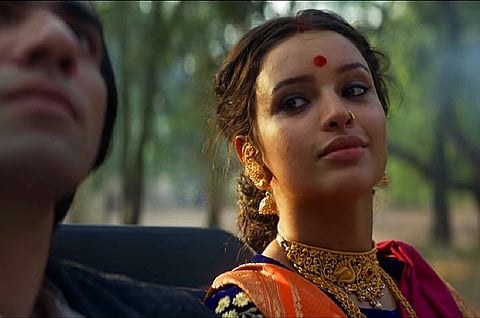

The witch, the dayan, the chudail… these were common characters in the ghost stories that many of us listened to when growing up. The trope was similar – an ugly, supernatural woman who was evil, sadistic and would inflict harm. Today, these words are used as derogatory terms to describe women who are different from the ‘ideal’, such as if they speak too loudly, don’t smile enough, don’t fit unrealistic beauty standards, work in their self-interest and so on. The trajectory has been similar elsewhere too – women who were targeted in the Salem witch trials in the US in the 17th century were arguably those who did not conform to gendered social expectations at the time.
In this context, Bulbbul offers a refreshing take on these sexist characterisations in folklore that demonise non-conforming women. Marking Anvita Dutt’s directorial debut, the film is produced by Anushka Sharma’s Clean Slate Filmz and released on Netflix on Wednesday. It has the feel of an old-world gothic horror story. And while it is nowhere close to the most chilling of the lot, or even the most suspenseful, it is the characters and context that make the film a worthy watch.
Bulbbul is set in 19th century Bengal and tells the story of Bulbbul (played by Tripti Dimri), a bubbly child bride wedded to a much older man, Indranil (Rahul Bose). The couple lives in a haveli along with Mahendra, Indranil’s twin with intellectual disability, his wife Binodini (Paoli Dam), and Indranil’s youngest brother, Satya (Avinash Tiwary).
Satya and Bulbbul are much closer in age, and so, an effortless friendship – and something more – blossoms between them, even though no apparent lines are crossed as they grow up. Binodini, meanwhile, is resentful and jealous that Bulbbul, who is much younger in age and married to the man Binodini truly desires – Indranil – is the ‘badi bahu’ (elder daughter-in-law) in the haveli. Mahendra has an affinity towards Bulbbul, perhaps because she is gentler and initially seemed closer to his own mental age.
And of course, there is a ‘chudail’, a rumoured demon-woman whose feet are turned backward, and who is central to the film and its message. She is said to murder men under the light of the crimson moon in the forest outside the haveli.
It is the delicate dance between these characters and the commendable portrayal of the complexity of these relationships that makes Bulbbul a deliciously layered story. While Rahul Bose does a great job playing the dual roles of a distant and cool man of the household as Indranil and the seemingly naïve and playful Mahendra, it is the characters of Bulbbul and Binodini that make the most impact. Tripti Dimri is fantastic as a young, restrained yet chirpy bride, which makes her transformation to a self-assured, unfazed and eerily calm woman even more striking. Paoli Dam’s character oozes resentment and jealousy with skilled restraint and her scheming and seduction are subtle but unmissable.
There is plenty that Bulbbul does well – it sheds light on the invisible boundaries that women must never cross, the unstated but pervasive scrutiny on women’s conduct, and the unreasonably harsh punishments for straying from it, as well as the silence and secrets around familial abuse that exist to this day. In some ways, it also shows how women wrest some of that power back by working around the existing social system. The pastel colour palette contrasted with the surreal and dreamy night sequences tinged in an ominous red hue are also stunning.
At heart though, Bulbbul is a rape revenge story, a genre that may appear empowering at face value, but is quite reductionist in its feminism. Despite the refreshing perspective that the film provides by unfolding mainly through the eyes of its female characters, Bulbbul becomes yet another film where a woman is empowered only after she takes revenge for sexual violation. And while it might seem as though this is a woman’s act of channelising her trauma, it reduces the experience of sexual assault to a black and white motive when it is more complicated than that.
The violence in the film is also unnecessarily prolonged and graphic. The incidents of violence are important to further the storyline, but the gore and slow-motion shots are voyeuristic and can be quite triggering. We know at this point that there are more sensitive ways of portraying sexual violence and assault, and the depiction need not be explicit to leave an impact.
Ultimately Bulbbul does manage what it set out to do – it is a ‘fairy tale’ like no other. Indeed, many fairy tales are romanticised (and often sexist) versions of rather disturbing incidents. Bulbbul stands out despite its problems because it does not bother to sanitise the ugly parts of the story. And in doing so, it is more real than most fairy tales could be.
Views expressed are author's own.